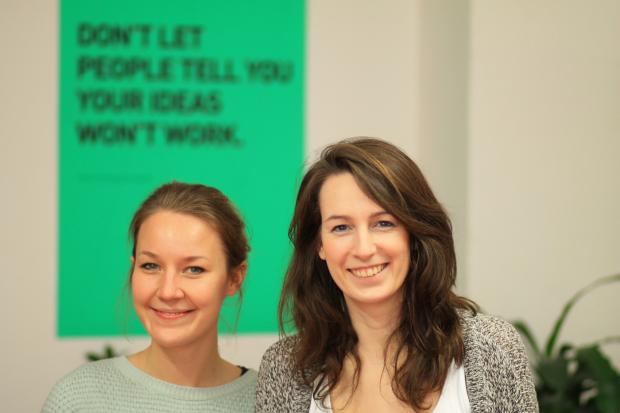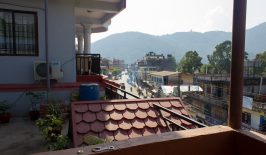Originally, Hanna Lutz and Stephanie Frost planned to set up a “sustainable hostel” in Berlin, a place where tourists could get involved in social projects during their stay. Hence the name “vostel” (volunteering + hostel).
Their first challenge was to find social projects that needed short-term volunteers and didn’t necessarily require volunteers to have German language skills. The second challenge was to find a suitable property in Berlin. The two quickly realized that cheap accommodation and sustainability definitely don’t go hand in hand, and the hostel idea was scrapped. What remained, however, was the idea of finding volunteering opportunities for tourists – and also the name vostel.de. Today, vostel is a volunteering organisation that works with primarily young individuals (both German and international) and corporate clients – connecting them with social projects that need a helping hand.
In interview with RESET, Hanna explains how the two of them became founders by chance, how they developed the business model for their platform – and why in the social sector, digitalisation is still a challenge.
Hanna, you found your niche by chance. How did that happen?
In 2015 we started out working with a handful of projects that thought our idea sounded good. The “Berliner Tafel” (an organisation that rescues leftover food, sorts it, and delivers it to social and charitable organizations throughout the city) was one of them. They require a large number of helping hands every day in order to sort the food and short-term volunteers are ideal for that. There was a huge amount of interest in helping out – but it didn’t come from tourists, who were the people we were aiming to reach.
So who was contacting you?
A lot of young people (aged between 18 and 34), who had always wanted to get involved, but were nervous about doing it because volunteering often requires a lot of preparation beforehand – first searching for a suitable project, then meeting up with a volunteer coordinator and sometimes taking part of seminars first. And many projects need you to make a long-term commitment – something which can be difficult for a lot of young people. Our platform offered them the chance to get a taste of what volunteering with an organisation would be like, and to try something out before deciding whether they wanted to stay in the long term.
We were also approached by a lot of international students: aupairs, exchange students etc, people who had wanted to get involved but couldn’t find suitable opportunities in Berlin. Most of the organisations’ volunteering information was written in German, meaning that non-German speakers often did not know whether they would be able to help if they didn’t speak much or any German at all.
The few projects we had on offer at the time were being completely overrun. It was clear to us that we had tapped into a niche, and we had to develop it further.
What exactly do you offer to help the organisations?
Organisations can list their volunteering opportunities on vostel.de and in that way advertise themselves on a well-designed website that has a visitor base of young people. That helps the organisations gain access to a new generation of volunteers. Many of our partner organisations have told us that previously they mostly worked with much older people and through us they’ve been able to develop a completely new target group. We also offer comprehensive and individual advice for each individual organisation on how they can best use our platform. In order to attract young people to a volunteer activity, the language you use is very important – so we often edit the descriptions to make them more appealing.
Are the organisations doing that wrong?
Well, many people write in the third person: “The volunteer should do this and that”. We formulate it differently: “Please bring with you the following skills”. And we promote the opportunities via social media channels where young people hang out: Instagram, Facebook, Twitter and co. We also regularly offer free workshops for social organisations on volunteer management 2.0 and how to build meaningful partnerships with businesses. And a few months ago we installed a donation tool: our partner organizations can post requests for material donations on vostel.de. Our corporate partners, who often have stuff to donate, and our volunteers too, are then able to know and donate exactly what is needed.
You have a bunch of different projects on offer in all kinds areas: working with refugees, with children and young people, food saving, upcycling… And now you’re also in Munich and Cologne too.
Exactly, and since the beginning of April we’re also working in Frankfurt, Darmstadt and Wiesbaden. In the future, of course, we hope to also be present in many other cities in Germany. When we chose a location, though, we check that they don’t already have a platform similar to vostel.de – we don’t want to become competition for them.
Whenever we go to a new location, we do a lot of research to find out which social projects are already established there and which are still very small – we particularly like supporting the smaller ones ones. And then we write to them, talk to them on the phone and visit those who want to get to know us. So we can introduce ourselves personally – and also help remove any scepticism they may have.
Why are they sceptical?
Because we’re an online, digital platform – and because we’re based in Berlin. It’s really difficult to get a foot in the door with some organisations because they simply don’t have a digital set-up yet. But as soon as we have the initial contact and the first volunteers arrive to them via our platform, most of the organisations are convinced and then they recommend us to others.
 © vostel.de Hanna Lutz (l.) and Stephanie Frost founded the social enterprise vostel after their original idea of a “volunteering hostel” didn’t work out as planned.
© vostel.de Hanna Lutz (l.) and Stephanie Frost founded the social enterprise vostel after their original idea of a “volunteering hostel” didn’t work out as planned.For the NGOs and the volunteers your service is free. You’re financed by a corporate volunteering program. How does that work?
We offer companies volunteering programmes on a range of different scales. The smallest scale corporate volunteering opportunity is the organisation of so-called “social days”. That’s when a large group of employees leaves their workplace for a day and goes to a social organization to do some good.
What do the teams do?
The classic task is for them to help with renovations. But we also host social days where certain skills are required, for example events where 20 HR people give one-day workshops to peopl who have sought asylum in Germany on how to write job applications. At the end of the day, those people have a CV and a cover letter and perhaps a photo too – taken by a company photographer who normally takes photos of models and clothes.
We also support companies that want to get involved on a larger scale and we support them in establishing a comprehensive corporate volunteering programme. One prominent example is Zalando, with its 12,000 employees. We offer them all of the different volunteering options available on our platform. We also advise them on how to get their employees involved. Getting people to sign up to a volunteering programme requires a lot of communication work – more than just sending them an email. By now we’re able to finance vostel through our corporate services.
Did you consider that business model at the beginning?
No, not at all! We actually planned to set up a charitable organisation, and were planning to rely on grants. But then we didn’t get non-profit status because we are only intermediaries between the social projects and the volunteers and not a social project ourselves per se – meaning we weren’t eligible for those subsidies. So we didn’t know what to do for a while.
Then we were approached by a large international company. They had started a programme that they wanted their – mostly international – employees to get involved in, but they were finding it difficult to find suitable volunteering opportunities. And so, in principle, that’s how our business model came into being – without us having planned it. And that’s why today we’re not a non-profit, but instead a social enterprise.






